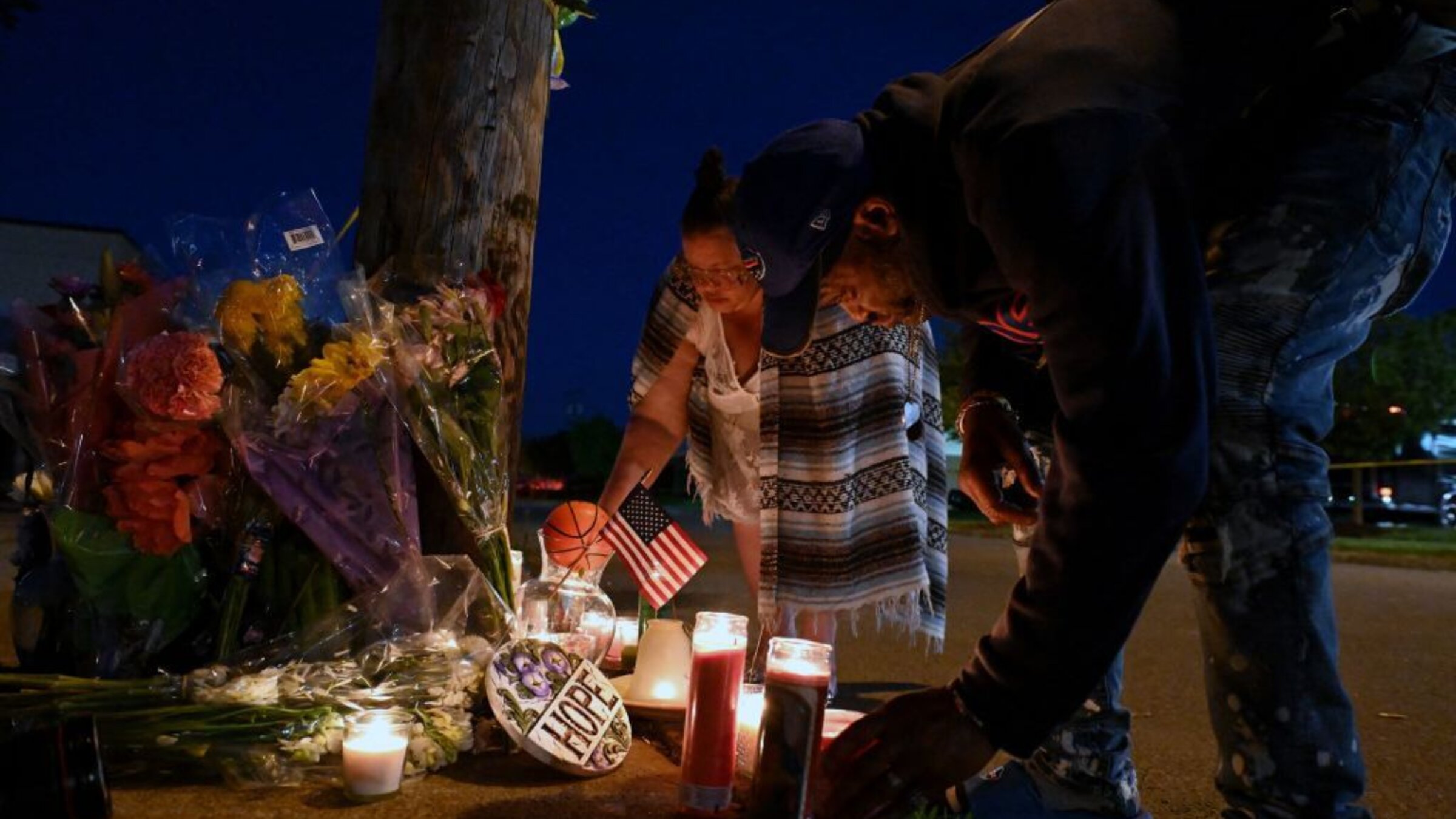The White House is holding a summit on extremist violence. Here’s what must come next
The summit should be the start of a more productive relationship, writes ADL CEO Jonathan Greenblatt

People light candles at a makeshift memorial near a Tops Grocery store in Buffalo, New York, on May 15, 2022, the day after a gunman shot dead 10 people. Photo by Usman Khan/AFP via Getty Images
Before walking into Tops supermarket in Buffalo, the 18-year-old alleged gunman — heavily armed and wearing tactical gear suitable for warfare — became immersed in hateful online conspiracy theories he believed thoroughly justified his actions.
The deadly attack was a horrific reminder of the dangers of domestic extremism and online conspiracies. In a matter of minutes, the gunman shot 13 people — 11 of them black, two of them white — while livestreaming the assault. The senseless attack left 10 dead and a nation grieving.
There are already considerable community efforts nationwide to prevent extremism and hate-fueled violence. But the fact that attacks like these continue to happen means that there’s much more work to be done. In 2021, domestic extremists killed at least 29 people in the U.S. in 19 separate incidents. Hate crimes overall rose by an alarming 6% in 2020, the highest level reported in the last 12 years. Antisemitic incidents reached an all-time high in 2021, with a total of 2,717 incidents reported nationwide. White supremacist activity remains at historic levels.
On September 15, the Biden Administration will convene a bipartisan United We Stand Summit at the White House dedicated to addressing this rise of hate-fueled violence, which is harming our nation’s most vulnerable communities and threatening our democratic institutions.
The Anti-Defamation League worked with our civil rights allies to advocate for this summit. We applaud the White House’s leadership in delivering on it now. It is long overdue. But our work can’t end with a one-day event. The summit will only be successful if it is the start of a more productive relationship between all stakeholders committed to fighting this hate.
If federal policymakers and philanthropic funders can be further inspired to work directly with those on the ground, they can better identify what works — and be in a position to scale it.
Viewed through the lens of the rising temperature of far-right activity in the U.S., Buffalo was a predictable event. But it also might have been preventable. How do we mitigate violent narratives from gaining traction online and in broader society?
First, organizations that specialize in countering extremism must come together and share resources and ideas with the highest levels of leadership. This is where the White House summit can be especially effective — ensuring that policy solutions are informed directly by the communities most impacted by hate-motivated violence.
What comes next
In August, the FBI and Department of Homeland Security issued a security bulletin urging law enforcement to “remain vigilant” for indicators of potential Buffalo copycat attacks.
Federal, state, and local governments must work collaboratively to address the threats posed by rising hate and extremism. According to administration officials, information sharing from federal officials to state and local partners to address these threats has increased three-fold between 2021 and 2022, a remarkable margin for a federal program. Still, we cannot ignore social media’s impact on inspiring individuals to engage in antisemitic violence.
Government entities need to do everything in their power to hold platforms accountable for their complacency as their platforms are used to coordinate and incite violence. Evidence has shown that violent antisemitic movements can inspire copycat acts, and the movements inspiring these attacks are only becoming more of a risk.
We must take critical steps today to avert the next tragedy. This includes building on the administration’s National Strategy to Counter Domestic Terrorism, which aims to help the federal government better understand the threats, better disrupt violent extremist movements, and prevent individuals from going down an extremist path by addressing root causes, such as a lack of trust in law enforcement.
Significant progress has been made, despite a difficult political environment, and it is a strategy so ambitious that it would be difficult for any administration to fully accomplish it. But much more must be done, including more funding for extremism prevention as well as more accountability for law enforcement and the tech sector.
But reversing the trend of rising extremism is not a task for the government alone. We need civic organizations to build new programming that fosters inclusion. We need corporations, particularly social media companies that have permitted this hate to spread on their platforms, to develop product features, create and enforce policies, and invest resources in personnel to meaningfully mitigate the spread of hate and quickly remove violent or inciting content. We need houses of worship to share messages of inclusion and our religious leaders to reject intolerant rhetoric.
Domestic extremism endangers all Americans, regardless of political persuasion. We all have a stake in the success of this summit — and that will be determined by the concrete actions and steps that follow. In standing with our partner organizations to raise these concerns to our elected leaders, we collectively recognize that failure is not an option.
To contact the author, email editorial@forward.com.
A message from our CEO & publisher Rachel Fishman Feddersen
I hope you appreciated this article. Before you go, I’d like to ask you to please support the Forward’s award-winning, nonprofit journalism during this critical time.
We’ve set a goal to raise $260,000 by December 31. That’s an ambitious goal, but one that will give us the resources we need to invest in the high quality news, opinion, analysis and cultural coverage that isn’t available anywhere else.
If you feel inspired to make an impact, now is the time to give something back. Join us as a member at your most generous level.
— Rachel Fishman Feddersen, Publisher and CEO